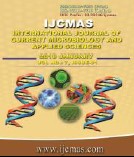


 National Academy of Agricultural Sciences (NAAS)
National Academy of Agricultural Sciences (NAAS)

|
PRINT ISSN : 2319-7692
Online ISSN : 2319-7706 Issues : 12 per year Publisher : Excellent Publishers Email : editorijcmas@gmail.com / submit@ijcmas.com Editor-in-chief: Dr.M.Prakash Index Copernicus ICV 2018: 95.39 NAAS RATING 2020: 5.38 |
The naturally toxigenic fungal flora, existing in conjunction with food production is most dominated genera namely, Aspergillus, Fusarium and Penicillium and to lesser extent the Alternaria, Claviceps and Stachybotrys. More than 300 mycotoxins are known to exist in nature. The economically important species of fungi producing significant mycotoxins as: aflatoxins (AFs), citrinin (CIT), cyclopiazonic acid (CPA), fumonisins (FBs), moniliformin (MON), ochratoxin A (OTA), deoxynivalenol (DON), nivalenol (NIV), T-2 toxin (T-2), patulin (PAT) and zearalenone (ZEA). Several impacts on consumers, such as loss of human and animal lives; health care and veterinary care costs; contaminated foods and feeds disposal costs; and investment in research and management of the myco-toxin problem. Myco-toxins are able to induce powerful and diverse biological effects. Diverse actions of myco-toxins have been characterized on animals and humans to include cytotoxic, carcinogenic, immunosuppressive, nephrotoxic, neurotoxic, mutagenic and oestrogenic effects. Pre and post-harvest management strategies are most important for management of toxicogenic fungi in food materials. Mycotoxin-detoxifying agents for reduction of the contamination of feed by mycotoxins that substances can suppress or reduce the absorption, promote the excretion of mycotoxins or modify their mode of action. These feed additives transform mycotoxins into less toxic metabolites either by reducing their bioavailability or by degrading them. Therefore, we can define at least two main categories; including first various mycotoxin adsorbing agents and second bio-transforming agents leads to degradation of mycotoxins into non-toxic metabolites. And also advanced detection techniques are help in ultra-trace amount of myco-toxin in food products as like; bio-sensors (1) electrochemical biosensors, 2) optical biosensors 3)electronic biosensors, 4)piezoelectric biosensors, 5) gravimetric biosensors, 6) pyro-electric biosensors.
 |
 |
 |
 |
 |